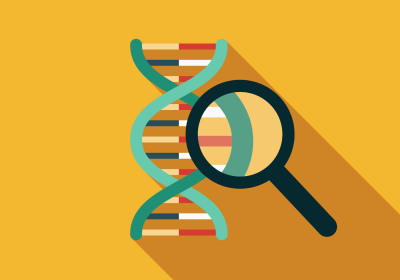Researchers, writing in Schizophrenia Bulletin, found that genetic factors explain about 0.5% of whether a person will meet criteria for the diagnosis of schizophrenia. That means that 99.5% is attributable to other factors. Anne Marsman from Maastricht University in the Netherlands was the lead author of the report, and the study included well-known psychosis researcher Jim van Os.
“Social-environmental circumstances, particularly childhood trauma and perceived status gap, drive most of the attributable variation in population mental health,” the study authors explain.

The researchers were trying to create a predictive model for the diagnosis of schizophrenia. They included everything they could find, including age and sex, social circumstances, pain, environmental risk factors, family history, and a polygenic risk score (PRS; a pattern of tens of thousands of genetic markers). This model enabled the researchers to see the relative contribution of each of these risks.
The researchers found that even with the inclusion of all of these factors, they were only able to predict 17% of whether a person went on to meet the criteria for a diagnosis of schizophrenia. Only 3% of 17% was attributable to genetics. That is, genetics explains about 0.5% of whether a person will receive a diagnosis of schizophrenia.
“In the combined model, familial and environmental factors explained around 17% of the variance in mental health, of which around 5% was explained by age and sex, 30% by social circumstances, 16% by pain, 22% by environmental risk factors, 24% by family history, and 3% by PRS for schizophrenia (PRS-SZ).”
The researchers tested their model for other diagnoses as well and found that genetics predicted even less for depression and bipolar disorder.
The researchers used data from the Netherlands Mental Health Survey and Incidence Study-2 (NEMESIS-2), which included 2380 participants.
According to the authors, the contribution of genetic risk is typically “evaluated on the basis of statistical significance-testing in massive samples, in which minute effects can acquire statistical significance.” However, statistical significance should not be confused for clinical relevance.
For instance, in a recent study, researchers looked at 90,595 people (49,588 of which had a history of anxiety/depression) and found “pathogenic” copy number variants (CNVs) in 708 of the participants. Even those with a “pathogenic” CNV, however, did not necessarily have a history of anxiety/depression. Although these CNVs were associated with slightly more risk of experiencing mental health issues, they provided no clinical value, and over 99% of the “depressed/anxious” people in the study did not have a CNV.
This is consistent with previous research, which found that even after sequencing the entire genome, genetic factors explained 2.28% of whether a person received a diagnosis of schizophrenia. In another study of “exome” sequencing, the researchers concluded that their results provided no relevant data regarding the risk of psychiatric diagnosis.
****
Marsman A, Pries LK, ten Have M, de Graaf R, van Dorsselaer S, Bak M, . . . & van Os J. (2020). Do current measures of polygenic risk for mental disorders contribute to population variance in mental health? Schizophrenia Bulletin, sbaa086. https://doi.org/10.1093/schbul/sbaa086 (Link)















Peter, thank you so much for your work in general and for this article in particular. Even though research does not support the tenets of the biological model, including the supposed genetic component of “mental illnesses,” these unsupported claims are accepted by the general public and treated as gospel by well-meaning providers, which, as you know, has a dramatic and potentially catastrophic effect on the lives of people in the mental health care system. Thank you so much for helping shine the light of science in the service of debunking harmful pseudo-science and promoting forms of support that are actually useful. I share your passion for dispelling biological psychiatry’s myths and supporting the invaluable support and solidarity being offered by people with lived experience to one another.
Report comment
Genetics May Predict About 0.5% of “Schizophrenia”
Using quotes doesn’t eliminate the contradiction that if “schizophrenia” is a figurative term “it” can not be subject to literal quantifcation (such as .5% or ANY %).
Report comment
Good point: a philosophy cannot be quantified.
My question: can a science theory predict an outcome percentage less than the percentage of their predicted fallibility rate? If the fallibility rate of data is plus or minus 5%, can it predict data less than 5% (like 0.5%)?
Report comment
Also a good point, if you theoretically assume their narrative as a given.
Report comment
Both of your points of view are important and an intriguing re-framing of the issue. Each question, scientific or philosophical, both put the article’s conclusion in a different light. Combining all three is so damn complicated. Does each play a role or should ‘one’ be given precedent? I guess this is why we need a multi disciplinary approach. How do we resolve the irreconcilable if we Have to sit at the same table? Or do we Have to sit at different tables in order to comfortably ‘resolve‘ it? Anyways.
Report comment
Does everything need a resolution? We can clearly see that resolution is not often something that actually occurs. And if it does, it can take eons.
Report comment
Thanks for highlighting that. Yes, I agree, although I’m not sure bending it toward rarely is correct or that taking the time is not worth it. But when dealing with so many variables/positions, and millions of people, it’s inevitable. I tried to suggest your point by putting ‘resolve’ in quotations and leaving it open-ended, where they go their separate ways but without a war breaking out (at the table). Each position tries to make a stab at it, and because each model can have a very real affect on people—the labeled, provider, researcher, and public—it is desirable to clarify and formulate reliable answers. We don’t want a jumble of competing illusions, although maybe that’s what we get. I know that sitting with the unknown and uncertainty is sometimes preferable, but not ideal. I’ll chew on this some more. I do think it would be a good and challenging class experiment to take varying positions and negotiate a plan of action that a ‘society’ could take. Maybe they will argue til they’re blue in the face and lead to civil war, or maybe it would lead to the kind of brain-storming, creativity, and negotiation that are so needed in the reformation of psychiatry. It would at least give students the multiplicity of views before they entered the field and crystallized into a specific decision. I assume as people in the field, they would have to take Some position, even if they differed from colleagues or even if it’s the formal position of abstaining completely.
Report comment
Thank you Peter for your valuable contribution. Carry on in your path. It will be much more rewarding not to be part of an establishment that is not there for the health of society. I say that as a mother 🙂
Report comment
The missing 83% are most likely just arbitrariness in diagnosis.
Report comment
Peter, like so much of your work, this is an important article. I agree with Oldhead, though, that to report the 0.5% statistic is a good start, but then to continue on to say what the rest of a totally in-valid entity called “schizophrenia” consists of undercuts the quotation marks used around the term in the headline. It makes it seem suddenly as though “schizophrenia” were a real entity BUT that only a tiny bit of it is accounted for by genetics. In fact, NO PERCENT can be accounted for by anything, since it has no scientific basis supporting the claim that it is a real entity…I hope people will read Robert Whitaker’s book, Mad In America, and Jeffrey Poland’s chapter called “Bias and schizophrenia” in the book Bias in Psychiatric Diagnosis. These make it clear that the category itself is a godawful mess. And we know it does massive harm.
Report comment
evanhaar,
I am not, and neither is psychiatry wanting a reform. At least psychiatry and I agree on one thing.
I think generally people are going to get a whole lot smarter and psychiatry is so backwards and dishonest
that smart people are going to question it, and more are in fact.
And psychiatry is very busy trying to pretend to do better, but you can’t do “better” if the whole concept is bogus.
Report comment
sam, this will be my last response as I don’t want to get into the thick of it. I welcome another response from you.
If there’s anybody who sympathizes with your general feeling, it would be me. I don’t consider most psychiatrists my colleagues, and definitely not my friends. However, two of my favorite authors were psychiatrists, Abram Hoffer and Carl Jung. They agreed mental illness, or dis-ease, exists, and that something should and could be done. They of course had many blind spots, inconsistencies, and problematic outlooks. I also think there’s an honest role for shamanisn in tribal societies, and that there is a place for modern shamanism, including both physical and psycho—spiritual methods. I think you’re right that most psychiatry and related industry services are not and will not reform/change. That’s one thing I’ve learned: they Don’t change. To the degree that this is true, I am referring to new management that have new ideals and different ways of doing things. I don’t believe psychiatry, in principle, needs to be bombed into oblivion like they do to so many patients. Like police and courts, I believe we need both, but a radical reallocation of funds and purposes should take place. Right now all of the above far too often, make a mockery of justice, guardianship, and medicine. We can’t change it into a void. But I support a radical re-visioning and re-orientation. I believe there are doctors of the past that play a role in the soul-doctoring of the future. Maybe I’m wrong, but I don’t think so. I’ll leave it at that. Take care.
Report comment